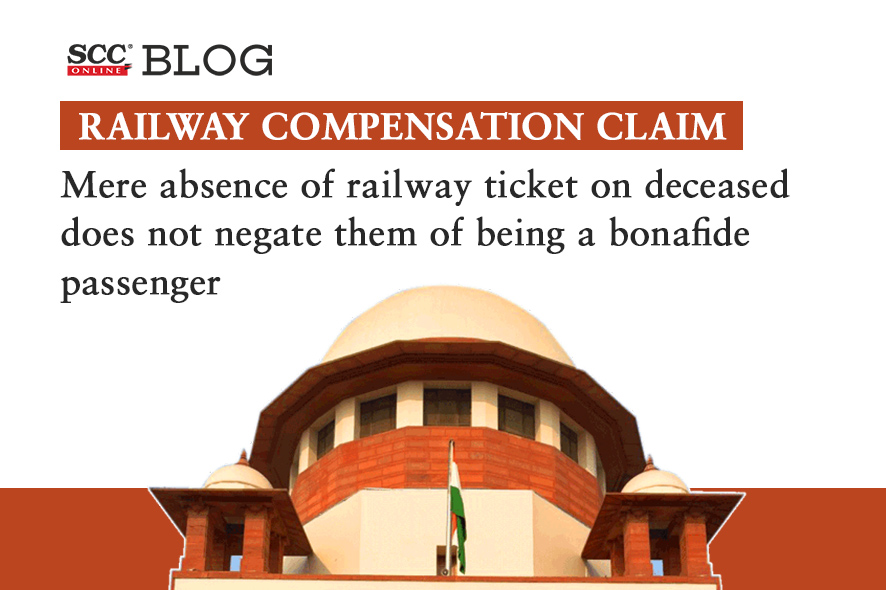Supreme Court: While hearing an appeal against the Judgement of Madras High Court wherein the decision of the Railway Claims Tribunal, Chennai Bench dismissing the claim petition for death compensation was upheld, the Division Bench of Surya Kant and J.K. Maheshwari*, JJ., allowed the appeal and held that deceased was a bonafide passenger and that as per the provisions contained in Section 124-A of Railways Act, 1989 and Railway Accidents and Untoward Incidents (Compensation) Rules, 1990, the appellants were entitled to claim compensation.
Background
In the matter at hand, the deceased reached Lalapettai Railway Station along with his son on 27-09-2014 who purchased the railway ticket to Karur and handed it over to deceased who boarded Train No. 56841- Trichy Erode Passenger to reach Karur. When the train reached Mahadanapuram Railway Station, due to heavy crowd in the compartment and jolting of the train, the deceased unexpectedly fell from the running train between the platform and track at Kilometer 90/200-300 and sustained grave injuries including decapitation and amputation of right hand. The deceased had died on the spot. FIR was lodged in Railway Police Station, Karur, and the final report revealed that death of the deceased was an outcome of untoward railway incident. The postmortem conducted in the Government Hospital, Karur indicates that the cause of death was due to shock and haemorrhage because of injuries on vital organs and decapitation of head.
Thereafter, a claim petition was filed on 25-07-2016 before the Railway Claims Tribunal, Chennai Bench seeking compensation to the tune of Rs. 4 Lakhs with 12 percent interest per annum from the date of filing of application till its realisation.
Court’s Decision
The Court perused Chapter XII of the Railways Act, 1989 (‘Railways Act’) which deals with the liability of Railway Administration for death and injury to passengers due to accidents. As per Section 124A, the Railway Administration is liable to pay compensation on account of an untoward incident. The Court said that the explanation of the said Section clarified that ‘passenger’ would include a person who has purchased a valid ticket for travelling by a train carrying passengers on any date or a valid platform ticket and becomes a victim of an untoward incident.
The Court said that as per the Statement of the deceased’s sons wherein he reiterated that ticket for deceased from Lalapettai to Karur was purchased for a sum of Rs. 10/- and he sent him off at Station to go to Karur. The Court said that the averment in the claim petition and the statement of Station Master was supported from the inquest report prepared by the Inquest Officer on the date of incidence i.e., 27-9-2014 and the final report prepared by the Investigation Officer, Railway Police Station Trichy on 14-11-2014. Considering the material on record, the Court viewed that the initial burden that the deceased passenger was having a valid ticket was discharged and the onus was shifted on the Railway Administration to disprove the said fact. However, the Court noted that nothing was placed before Claims Tribunal or brought on record during the course of hearing that the Railway Administration has discharged the burden of not having the valid railway ticket with the deceased passenger, except to say that during recovery, the ticket was not found. Placing its reliance on Union of India v. Rina Devi, (2019) 3 SCC 572, wherein it was concluded that mere absence of ticket with injured or deceased will not negative the claim that he was a bonafide passenger, the Court said that it was proved beyond reasonable doubt that deceased had died in an untoward incident which took place on 27-9-2014 while travelling in a passenger Train No. 5684 and he was a bonafide passenger. Therefore, the Court held that as per the provisions contained in Section 124-A of the Railways Act and Railway Accidents and Untoward Incidents (Compensation) Rules, 1990, the appellants were entitled to claim compensation.
The Court also noted that after the date of accident and filing the claim petition on 25-7-2016, the Compensation Rules, 1990 were amended w.e.f. 01-01-2017. Therefore, the Court considered it appropriate to decide the amount of compensation while taking into account the amended Rules.
The Court said that the said issue was considered by the Court in the case of Rina Devi (supra), wherein it was concluded that compensation will be payable as applicable on the date of the accident with interest as may be considered reasonable from time to time on the same pattern as in accident claim cases. If the amount so calculated is less than the amount prescribed as on the date of the award of the Tribunal, the claimant will be entitled to higher of the two amounts. Compensation as applicable on the date of the accident must be given with reasonable interest and to give effect to the mandate of beneficial legislation, if compensation as provided on the date of award of the Tribunal is higher than unrevised amount with interest, the higher of the two amounts must be given.
Thus, the Court allowed the present appeal and set aside the impugned judgments dated 26-03-2021 passed by the High Court and also the Claims Tribunal’s dated 29-06-2017. Consequently, the claim application was allowed. The appellants were held entitled for compensation to the tune of Rs. 4,00,000/- along with interest at the rate of 7 percent per annum, from the date of filing the claim application till its realisation. The Court also clarified that after applying the rate of interest, if the final figure is less than Rs. 8,00,000/-, then appellants shall be entitled to Rs. 8,00,000/-. The Court had also directed the respondents to pay the amount of compensation within the period of eight weeks.
[Kamukayi v. Union of India, 2023 SCC OnLine SC 642, Decided on 16-05-2023]
*Judgment Authored by: Justice J.K. Maheshwari







